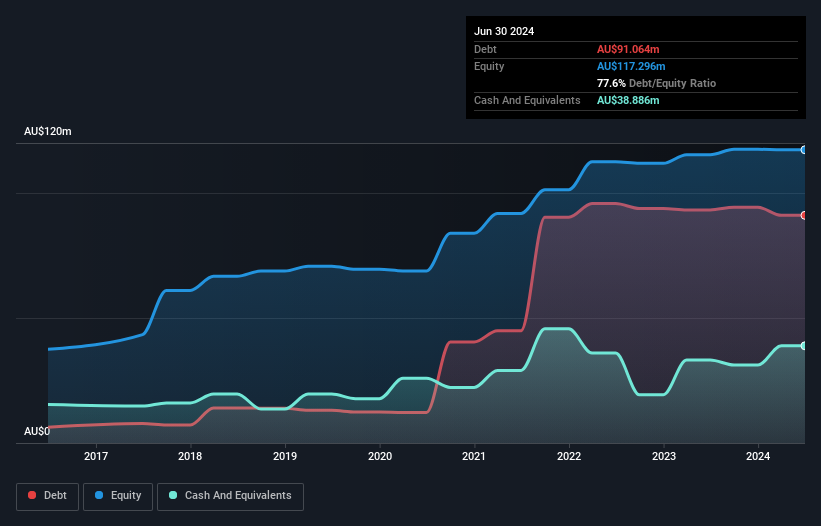- Australia
- /
- Retail Distributors
- /
- ASX:NTD
NTAW Holdings (ASX:NTD) Takes On Some Risk With Its Use Of Debt
Some say volatility, rather than debt, is the best way to think about risk as an investor, but Warren Buffett famously said that 'Volatility is far from synonymous with risk.' So it might be obvious that you need to consider debt, when you think about how risky any given stock is, because too much debt can sink a company. Importantly, NTAW Holdings Limited (ASX:NTD) does carry debt. But should shareholders be worried about its use of debt?
When Is Debt A Problem?
Debt assists a business until the business has trouble paying it off, either with new capital or with free cash flow. In the worst case scenario, a company can go bankrupt if it cannot pay its creditors. However, a more frequent (but still costly) occurrence is where a company must issue shares at bargain-basement prices, permanently diluting shareholders, just to shore up its balance sheet. Having said that, the most common situation is where a company manages its debt reasonably well - and to its own advantage. The first step when considering a company's debt levels is to consider its cash and debt together.
See our latest analysis for NTAW Holdings
What Is NTAW Holdings's Debt?
As you can see below, NTAW Holdings had AU$91.1m of debt, at June 2024, which is about the same as the year before. You can click the chart for greater detail. However, because it has a cash reserve of AU$38.9m, its net debt is less, at about AU$52.2m.

How Healthy Is NTAW Holdings' Balance Sheet?
Zooming in on the latest balance sheet data, we can see that NTAW Holdings had liabilities of AU$137.8m due within 12 months and liabilities of AU$157.9m due beyond that. On the other hand, it had cash of AU$38.9m and AU$74.4m worth of receivables due within a year. So its liabilities total AU$182.3m more than the combination of its cash and short-term receivables.
This deficit casts a shadow over the AU$52.3m company, like a colossus towering over mere mortals. So we'd watch its balance sheet closely, without a doubt. After all, NTAW Holdings would likely require a major re-capitalisation if it had to pay its creditors today.
In order to size up a company's debt relative to its earnings, we calculate its net debt divided by its earnings before interest, tax, depreciation, and amortization (EBITDA) and its earnings before interest and tax (EBIT) divided by its interest expense (its interest cover). This way, we consider both the absolute quantum of the debt, as well as the interest rates paid on it.
While we wouldn't worry about NTAW Holdings's net debt to EBITDA ratio of 2.8, we think its super-low interest cover of 1.2 times is a sign of high leverage. So shareholders should probably be aware that interest expenses appear to have really impacted the business lately. Fortunately, NTAW Holdings grew its EBIT by 2.4% in the last year, slowly shrinking its debt relative to earnings. When analysing debt levels, the balance sheet is the obvious place to start. But you can't view debt in total isolation; since NTAW Holdings will need earnings to service that debt. So if you're keen to discover more about its earnings, it might be worth checking out this graph of its long term earnings trend.
Finally, a business needs free cash flow to pay off debt; accounting profits just don't cut it. So the logical step is to look at the proportion of that EBIT that is matched by actual free cash flow. Over the last three years, NTAW Holdings actually produced more free cash flow than EBIT. That sort of strong cash generation warms our hearts like a puppy in a bumblebee suit.
Our View
To be frank both NTAW Holdings's interest cover and its track record of staying on top of its total liabilities make us rather uncomfortable with its debt levels. But at least it's pretty decent at converting EBIT to free cash flow; that's encouraging. Looking at the bigger picture, it seems clear to us that NTAW Holdings's use of debt is creating risks for the company. If everything goes well that may pay off but the downside of this debt is a greater risk of permanent losses. The balance sheet is clearly the area to focus on when you are analysing debt. But ultimately, every company can contain risks that exist outside of the balance sheet. For example NTAW Holdings has 4 warning signs (and 2 which don't sit too well with us) we think you should know about.
Of course, if you're the type of investor who prefers buying stocks without the burden of debt, then don't hesitate to discover our exclusive list of net cash growth stocks, today.
Valuation is complex, but we're here to simplify it.
Discover if NTAW Holdings might be undervalued or overvalued with our detailed analysis, featuring fair value estimates, potential risks, dividends, insider trades, and its financial condition.
Access Free AnalysisHave feedback on this article? Concerned about the content? Get in touch with us directly. Alternatively, email editorial-team (at) simplywallst.com.
This article by Simply Wall St is general in nature. We provide commentary based on historical data and analyst forecasts only using an unbiased methodology and our articles are not intended to be financial advice. It does not constitute a recommendation to buy or sell any stock, and does not take account of your objectives, or your financial situation. We aim to bring you long-term focused analysis driven by fundamental data. Note that our analysis may not factor in the latest price-sensitive company announcements or qualitative material. Simply Wall St has no position in any stocks mentioned.
About ASX:NTD
NTAW Holdings
NTAW Holdings Limited, together with its subsidiaries, markets and distributes motor vehicle tires, wheels, tubes, and related products in Australia, New Zealand, and South Africa.
Good value with mediocre balance sheet.
Market Insights
Community Narratives



